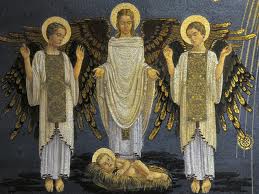 In August 2011, Mark S. Smith (Skirball Profesor of Bible and Near Eastern Studies at New York University) delivered his presidential address at the Catholic Biblical Association of America meeting, which was published in the Catholic Biblical Quarterly the next year (issue 74, 2012).
In August 2011, Mark S. Smith (Skirball Profesor of Bible and Near Eastern Studies at New York University) delivered his presidential address at the Catholic Biblical Association of America meeting, which was published in the Catholic Biblical Quarterly the next year (issue 74, 2012).
The address is entitled “God in Israel’s Bible: Divinity between the World and Israel, between the Old and the New.” The meat of it gives an overview of the evidence for the “early history” of Israel’s God Yahweh according to the biblical and extrabiblical evidence.
A few posts on this topic of have popped up on this blog recently (for example here), but my point today isn’t to go over the arguments themselves, as fascinating as they are.
Rather, I want us to catch a glimpse of Smith’s own theological posture from which he works through this complex–and for some, I imagine, unsettling–issue.
If you’re familiar with this blog and some of my own writings on the Bible (e.g., here
, here, and
here)
you’ll notice some overlap between Smith’s theological posture and my own in approaching the historical study of the Bible from a position of faith.
Of course, there are differences too. For one thing, Smith is WAY smarter than I am. On the other hand, I can play Day Tripper on the guitar, and I’ll bet he can’t. But that’s not the point. I just find his thoughts on theology to be interesting and I think many of you will, too.
I picked out 4 quotes, and I post the first one here with the others to follow.
As a Catholic Christian for whom the incarnation is a central mystery of faith, it seems to me that in the search for God little refuge will be found behind the walls of the text: God is not met in the text without reference to the world outside the text. God is met in our world, and not only in our canon and not only in our church. In our study of the Scriptures, God awaits both within and without, and perhaps notably in the encounter between the two. This viewpoint, it seems to me, is hardly a modern or secular one. It informs Israel’s earliest glimpses of God, as identified by historical criticism. (4)
In other words, taking the incarnation seriously means taking the study of history seriously.
Even the study of Scripture on its own canonical terms will drive one, sooner or later, to historical study as well. Why? Because at some point, usually when we confront interpretive dilemmas (like the diverse portraits of Israel’s God that Smith writes about), questions like the following come up:
- What would this have meant to the people who first heard it?
- When was this written?
- Why do these texts give such different points of view on the same subject?
These are historical questions, folks. And we all ask them. If you don’t believe me, check the notes, maps, and charts, in your study Bibles.
Taking refuge in the canon as an excuse to ignore historically oriented questions and our growing knowledge of antiquity, and thus maintain a theological status quo, is not being “faithful to Scripture” but obscurantist.
It also fails to take the incarnation seriously, as just an unfortunate but temporary and disposable necessity for the transcendent God to make a cameo.
By setting texts in historical–not simply canonical and dogmatic–contexts, we get to know God better. That’s what Smith seems to be saying. I know I’ve had the same experience many times, too.
